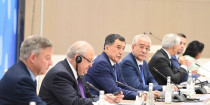Join Helga Zepp-LaRouche in her live dialogue and discuss the issues and solutions that move the world and its people. Send your questions, comments, and reports to questions@schillerinstitute.org or post them in the live stream chat.
Monday Oct. 13 was a bittersweet day. Hamas released all 20 of the remaining Israeli hostages, not including the 4 deceased who were also returned to their families. At the same time, Israel released 2,000 Palestinian prisoners—some of whom had not been seen for decades—to shouts of joy and celebration. Much-needed humanitarian aid, medicine, and cooking fuel also began to flow into Gaza by the truckload, in a way that has not happened for months and years.
Despite all this, it’s impossible to ignore the less-than-ideal speech of U.S. President Donald Trump in the Israeli Knesset, replete with his adulation of the wicked Miriam Adelson; or the toothy grin of Prime Minister Benjamin Netanyahu, who deserves prison instead of praise; or the reports of widespread arson across the Gaza Strip, as evacuating IDF soldiers leave yet further destruction in their wake. This includes the incineration of one of Gaza’s last remaining waste treatment centers, putting all of Gaza City, after two years of genocidal war, finally without this vital piece of infrastructure.
So yes, bittersweet: Because a ceasefire has been achieved and the killing has stopped, yet the perpetrators escape responsibility, justice has not been served, and talk of a Palestinian state appears nonexistent.
A fundamental sea change is required to turn this brief but invaluable moment into something truly lasting—not only for Palestinians, but also for Israel and for the region as a whole. And the current batch of leadership around Trump and Netanyahu, especially if Tony Blair is allowed to play a role, is inadequate at best. A transcendental change is required if a return to the bloodshed and the same cycle of violence is to be avoided.
Toward this end, it’s important to consider the words of former Speaker of the Knesset Avrum Burg, who wrote on Oct. 12 about the developments of the recent days: “There are moments in history when not only states change but entire nations. It is not borders that are redrawn but consciousness itself; not governments that are replaced but the collective soul that undergoes transformation. After 1945 the Germans awoke from the nightmare of Nazism and faced what had been done by them and in their name. After Vietnam, Americans emerged from the shattering of national innocence as a different people. The war in Gaza is such a moment for the Jewish people. It is not another round in the endless cycle of Middle Eastern violence but a historic turning point. It is a moment in which we must look in the mirror and recognize what we have become. And it is ugly.”
Burg goes on to call for exactly such a transcendental change. He condemns the policies of vengeance, racial supremacy, and religious fundamentalism, and instead evokes the better traditions of Judaism. “The beating heart of Judaism was never physical force but spiritual refinement,” Burg continues. “The Jewish hero was never the neighborhood bully but ‘the one who conquers his own impulse,’ and ‘the one who turns his enemy into a beloved friend.’” He calls for a “Global Jewish Fund for the Reconstruction of Gaza,” as well as other actions to salvage the situation for Palestinians, and pave the way for a peaceful coexistence between the two peoples. These are not intended as a mere “political gesture,” he writes, but rather are “the only way to survive spiritually.”
As a former leading member of Israel’s government, Burg’s sentiment underscores the potential that exists for such a transcendental shift. In this context, the LaRouche Oasis Plan for Southwest Asia becomes more important than ever. The Oasis Plan has the potential to completely change the parameters of the current negotiations, establishing the physical requirements for the prosperity of all and redefining the environment in which long-term peace can blossom.
This is not a period to sit and criticize, but one to envision what a better future can and must look like, and organize for it. Join the effort.










